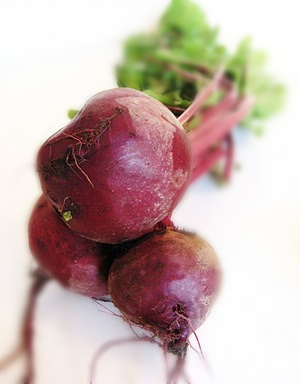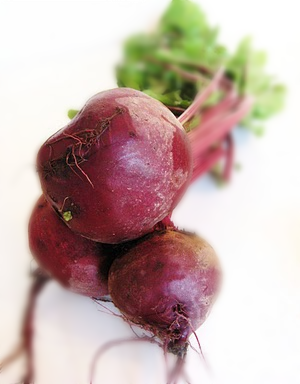Beetroots are root vegetables frequently used in cooking as a salad, pickles or even part of your beef burger. There are many other ways you can cook beet. You can have it as a roast, boiled, is popular in salads and it makes a great side dish for pork and chicken. 
Believe it or not, I did not actually know what beetroots are until later on in my teens as my mum never used beetroots or beet in her cooking.
My first experience eating beet was when I had it as a side dish while eating in a local restaurant nearby. I thought to myself that I must have ordered one of the worst dishes for dinner. It looked pretty red all over with a bit of salad and cheese around it. I actually ordered the dish out of curiosity for the taste of beet. The dish was actually roasted beet salad with goat cheese which is one very common way of cooking beet.
After a few mouthfuls, I was quite surprised that it is fresh and the taste was very well balanced. The roasted beet flavour is really good. In short, I was impressed. Since my first tasting, I have tried a variety of beet recipes that I have also incorporated into juicing recipes and even spirulina smoothie recipes.
I’ve also discovered quite a few things about beet which I want to share with you, including its health benefits. We’ll start with some cooking tips.
Cooking Tips for Beetroot
- Beetroots and beet can be eaten raw. Sure, they are normally cooked as they may not taste as good when raw and they are also more difficult to digest if eaten raw. If you don’t want to cook them, juicing them makes it easier for your body to digest.
- When preparing beetroots, you will definitely run into the problem of stained clothing or fingers unless you take necessary steps like wearing gloves during preparation or wrapping them in foil paper.
- If you want to peel your beetroot prior to cooking, it is better to use a swivel vegetable peeler for better results than using a peeling knife.
- To maintain the bright red or deep red colour of beets, just add a tablespoon of vinegar. This small trick also reduces the odour of beet.
- One of the best ways to get flavour out of your beet is to bake or roast them. Conventional cooking.
- A great method to prepare beet inspired salads is to grate them.
- It really isn’t necessary to add salt into beet as they already have high sodium content.
- Baby beetroot is best for salads as it is sweeter.
- To prevent your beetroot from “bleeding”, leave at least 1 inch of leaf stems attached and do not remove the beet root until after cooking.
Beetroot and Your Health
Beetroot is a very cardiovascular friendly vegetable. Other theoretical benefits are mainly from antioxidants found in beet which have been shown in some animal studies to prevent growth of certain types of cancers.
Here are some interesting health related benefits from eating beet:
- Beet contains betaine, a compound found to reduce inflammation.
- Betaine is also good for cardiovascular health as it prevents homocysteine buildup.
- An interesting research published in a number of scientific journals including the journal Hypertension has shown that drinking beetroot juice lowers blood pressure. This anti-hypertensive effect is due to the high content of nitrates. Nitrates causes vasodilatation which reduces blood pressure and hence increased blood flow.
- Want to feel good? Eat lots of beet as it has tryptophan, a similar “feel good” chemical found in chocolate.
Precautions on Eating Beetroot
You may love your beetroot but you might not know that some of us may just have to be careful.
- High consumption of beet can cause higher amounts of oxalate. Most kidney stones have oxalate crystals in them. Although beet does result in higher concentrations of oxalate in our body, we must be consuming insane amounts of beet or beetroot before it causes kidney stones. Having said that, people with kidney stones should not take too much beet or just stay away from them completely.
- Another common but not dangerous side effect of eating beet is that you will pass urine that appears redder in colour. This is caused by the compound betanin.
Bryan writes about almost all things health. His most passionate interests is in the area of diet. He is an advocate for most things natural and believes in less processed and more organic foods. He also writes for http://www.jljuicer.com/

